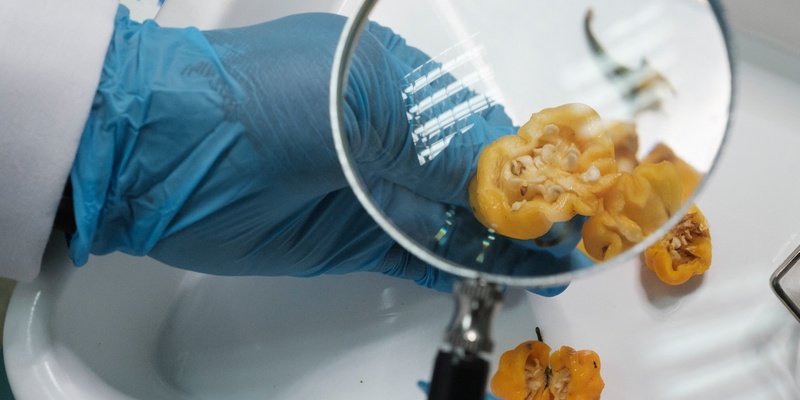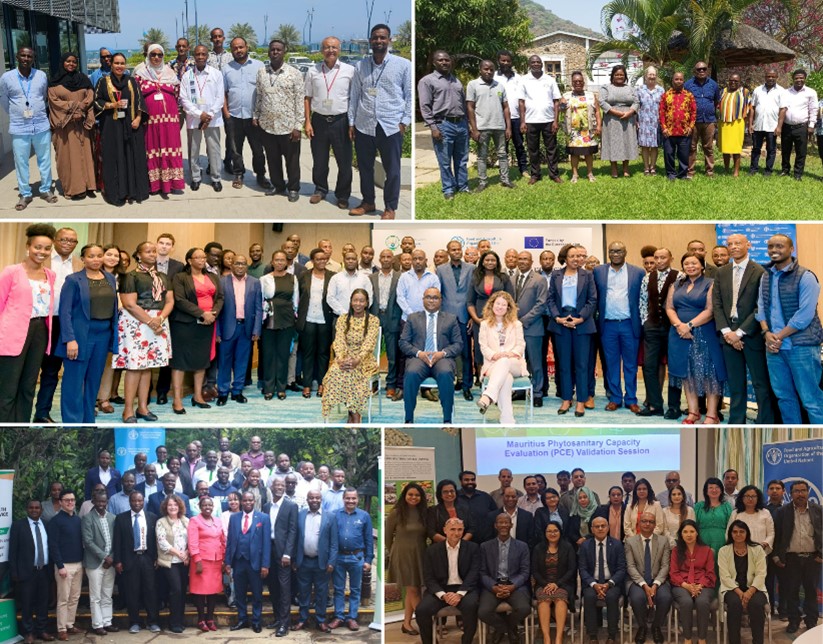Les exercices d'évaluation des capacités phytosanitaires de la CIPV ont permis de renforcer la santé des végétaux en 2023
Posted on mer, 31 Jan 2024, 15:06

© FAO/Eduardo Soteras
Rome, 31 janvier 2024 – En 2023, le Secrétariat de la Convention internationale pour la protection des végétaux (CIPV) a accompli de grandes avancées en faveur de la santé des végétaux. L'une des réalisations notables a été la mise en œuvre de la stratégie d'évaluation des capacités phytosanitaires (ECP) pour la période 2020-2030.
Grâce à cette stratégie, la CIPV a aidé 13 organisations nationales de la protection des végétaux (ONPV) d'Afrique et d'Asie à effectuer une ECP afin d'évaluer le système phytosanitaire de leur pays. La réalisation de ces ECP montre que les pays prennent de plus en plus conscience de l'importance de disposer de systèmes phytosanitaires nationaux solides pour préserver la santé des végétaux, assurer la sécurité sanitaire des aliments et favoriser l'innocuité du commerce.
L'ECP est un cadre en ligne à étapes multiples que les pays utilisent pour évaluer l'adéquation de leurs systèmes et capacités phytosanitaires nationaux, notamment en termes de laboratoires, de centres de quarantaine et de systèmes de stockage de données, afin de satisfaire aux exigences phytosanitaires mondiales. L'ECP est un processus très souple entièrement dirigé par l'ONPV, laquelle adapte l'évaluation aux besoins et aux objectifs du pays. Les résultats et les recommandations sont donc propres à chaque pays et traduisent la volonté de celui-ci d'améliorer sa capacité phytosanitaire au niveau national. En Afrique, neuf pays du Marché commun de l'Afrique orientale et australe (COMESA), à savoir Djibouti, l'Eswatini, le Kenya, le Malawi, Maurice, le Rwanda, les Seychelles, la Zambie et le Zimbabwe, ont effectué une ECP. En décembre 2023, huit d'entre eux avaient examiné et approuvé les résultats de leur ECP, et le dernier devait valider les résultats de son ECP en février 2024. Les pays bénéficiaires devraient contribuer à renforcer la production agricole et la biodiversité de l'Afrique ainsi qu'à favoriser l'innocuité du commerce et la sécurité alimentaire sur le continent. En aidant les pays à mener des ECP, la CIPV promeut le Cadre politique sanitaire et phytosanitaire (SPS) de l'Union africaine pour l'Afrique, qui vise à établir des systèmes SPS harmonisés et fondés sur la science, à renforcer la collaboration et la facilitation des échanges et à accroître les capacités techniques.
«De nombreuses parties prenantes comprennent aujourd'hui l'importance cruciale de préserver la santé des végétaux pour favoriser directement la sécurité alimentaire et le développement économique durable. Cette prise de conscience permet d'établir des collaborations et est l'occasion d'adopter une approche globale en vue d'améliorer la santé des végétaux aux niveaux régional et mondial. L'évaluation des capacités phytosanitaires est une étape clé vers la réalisation de cet objectif», a déclaré le Secrétaire de la CIPV, M. Osama El-Lissy.
Davantage de pays réalisent des ECP
Outre les pays du COMESA indiqués plus haut, le Sénégal a validé son ECP en août 2023 et a souligné l'importance d'améliorer les services de laboratoire pour préserver la santé des végétaux et faciliter le commerce. Grâce à l'ECP, le Sénégal espère réduire les délais et les coûts d'exportation des produits agroalimentaires tout en se conformant aux normes internationales telles que l'Accord de facilitation des échanges de l'Organisation mondiale du commerce (OMC) sur les exigences révisées en matière de documentation et concernant la mainlevée des marchandises périssables.
En Asie, lorsqu'ils ont validé leurs processus d'ECP, le Cambodge et le Sri Lanka ont pu déterminer les lacunes de leurs systèmes phytosanitaires nationaux. Les deux pays élaborent actuellement des stratégies de renforcement des capacités phytosanitaires nationales, qui consistent notamment à réviser la législation phytosanitaire nationale et à obtenir un financement externe pour mettre en œuvre les améliorations.
En avril 2023, l'Ouzbékistan a validé son ECP. Il s'agit là d'une étape cruciale pour le pays, car cela lui permet de définir les réformes phytosanitaires à mettre en œuvre, de se conformer aux normes mondiales et de démontrer ses compétences en matière de gestion du risque phytosanitaire.
Après avoir approuvé les résultats de leur évaluation des capacités phytosanitaires nationales, les pays peuvent aligner leur législation nationale sur la CIPV et ses normes internationales pour les mesures phytosanitaires (NIMP), mettre en œuvre efficacement les procédures opérationnelles, renforcer les capacités de diagnostic, moderniser les laboratoires, améliorer l'accès à la formation, optimiser la structure de leur ONPV et améliorer la coordination entre les parties prenantes.
Les résultats positifs obtenus en 2023 soulignent l'importance de préserver la santé des végétaux et de mettre en place des systèmes phytosanitaires nationaux solides. La collaboration entre les entités nationales et internationales joue un rôle essentiel pour atteindre ces objectifs. En 2024, d'autres pays, notamment l'Égypte, l'Ouganda, les Philippines et les membres de la Communauté économique et monétaire de l'Afrique centrale (CEMAC), évalueront leurs systèmes phytosanitaires, ce qui permettra d'accomplir de nouveaux progrès en matière de santé végétale.
La CIPV a aidé les pays à mener et à valider leurs ECP grâce au financement et à l'assistance technique fournis par les projets suivants: le projet mondial de la CIPV sur le renforcement des capacités mené dans le cadre du Programme FAO-Chine pour la Coopération Sud-Sud (CSS), le projet intitulé «L'ePhyto de la CIPV et l'évaluation des capacités phytosanitaires», financé par l'Agence allemande pour la coopération internationale (GIZ), l'Agence des États-Unis pour le développement international (USAID) et la Banque asiatique de développement, et un projet de la CIPV financé par l'Union européenne (UE), intitulé «Renforcer les capacités et la gouvernance dans le domaine du contrôle des aliments et en matière phytosanitaire». Le projet vise à aider les pays à protéger la santé des végétaux en réalisant des ECP et à promouvoir la sécurité sanitaire des aliments grâce à l'outil FAO-OMS d'évaluation des systèmes de contrôle des aliments.

En haut à gauche: Mission de validation de l'ECP à Djibouti © FAO/Lucien Kouame. En haut à droite: Mission de validation de l'ECP au Malawi © CIPV. Milieu: Mission de validation de l'ECP et de l'outil FAO-OMS d'évaluation des systèmes de contrôle des aliments au Rwanda © FAO/Jabo Nkurunziza. En bas à gauche: Mission de validation de l'ECP au Kenya © FAO/Fredrick Onyango. En bas à droite: Mission de validation de l'ECP à Maurice © FAO/Sachita Jawaheer
Informations connexes:
-
ECP à Sainte-Lucie: la collecte de données, élément clé pour améliorer la santé des végétaux
-
Comment la nouvelle loi phytosanitaire du Nicaragua aide les petits exploitants agricoles
-
Le Sri Lanka adopte une approche pratique pour améliorer la santé des végétaux
-
Maurice achève l'évaluation de son système phytosanitaire national
-
Fiche d'information: Améliorer les capacités phytosanitaires dans les pays de l'Union africaine
-
Page du PPI sur l'évaluation des capacités phytosanitaires (ECP)

